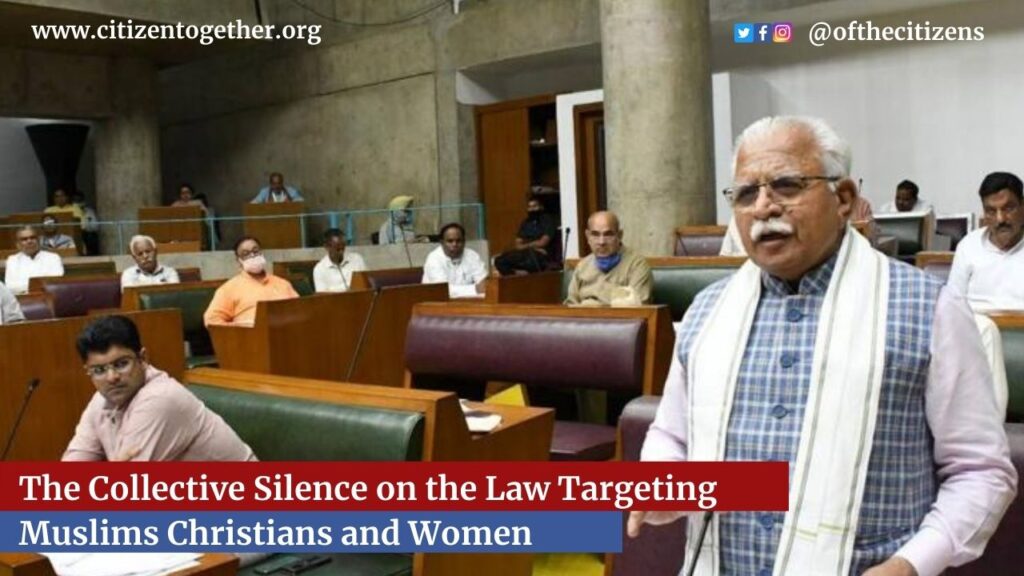On Friday, March 4, the Bharatiya Janata Party government in Haryana introduced the Haryana Prevention of Unlawful Conversion of Religious Bill, 2022 in the Vidhan Sabha. This step by the Haryana government follows similar moves by Uttar Pradesh, Uttarakhand, Madhya Pradesh, Himachal Pradesh, Gujarat and Karnataka, all BJP run states. These have been later passed as laws. This Bill was introduced in Haryana Vidhan Sabha’s ongoing Budget session and was protested by the Opposition Congress’s Dr Raghuvir Singh Kadian. Kadian, a six-time MLA, tore a copy of the Bill on the floor of the House as home minister Anil Vij introduced The Prevention of Unlawful Conversion of Religion Bill, 2022. According to IE, Kadian asserted that the Bill reeks of a “hidden agenda” of the state government to create a divide in the society on the basis of religion. However, Anil Vij read the provisions of the Bill and said that the Bill was only aimed at the forceful conversion of religion and that it covers all religions and not any religion in particular. Kadian then tore off Bill’s copy that was tabled in the House and was subsequently suspended for it.
There has, however, been near silence from civil society of the region, especially Muslim, Christian and women’s rights groups, who are the ones most affected by such a law as seen in other states. It is not like the law was introduced secretly, as a year ago, Haryana Chief Minister Manohar Lal Khattar, had spoken about it in the context of the so-called Love Jihad that most right-wing groups refer to inter-religious relationships as. The BJP-JJP led Haryana government had been mulling over an anti-conversion law since 2020. In August 2021, Chief Minister Manohar Lal Khattar had addressed a press conference declaring that the final draft of the “forced religious conversions” bill will be finalised soon. Khattar had said, “Law is enacted to create a deterrent for people when they start doing something wrong. Such incidents [of ‘love jihad’] have started taking place in a few places of Haryana. Till the time these were not happening, or when there were only one or two such incidents, there was no requirement of such a law in this regard. But now several incidents of forced religious conversion by way of coercion and allurements have come to light. To prevent such incidents from happening, such laws are required. By way of example, I can say this is why we passed the anti-copying Bill. Laws are required to prevent any of these incidents from increasing in number” reported the Indian Express. The draft of the Bill was approved by the state Cabinet chaired by Khattar in February. Now, the Bill is ready to be passed.
According to media reports the Bill seeks to “prohibit religious conversions which are effected through misrepresentation, force, undue influence, coercion, allurement or by any fraudulent means or by marriage or for marriage by making it an offence”. The draft states that “the individual right to freedom of conscience and religion cannot be extended to construe a collective right to proselytise; for the right to religious freedom belongs equally to the person converting and the individual sought to be converted. Still, there have been umpteen cases of religious conversions, both mass and individual. Obviously, such incidents have been hotly debated, more so in a multi-religious society, such as ours. The presence of pseudo-social organisations with a hidden agenda to convert the vulnerable sections of other religions. There have been instances when gullible people have been converted by offering allurement or under undue influence. Some have been forced to convert to other religions.” The BJP-governed states of Karnataka, Uttar Pradesh, Gujarat, Himachal Pradesh Madhya Pradesh, and now Haryana have brought such a Bill and Law in force and other BJP-ruled states such as Assam, have also voiced their desire to enact similar laws to prevent conversions.
Recently Arvind Kejriwal, Delhi Chief Minister and Aam Aadmi Party (AAP) leader, also echoed right-wing politicians and said that an “anti-religious conversion” law must be made in Punjab. He had said, “Religion is a private matter. Everybody has the right to worship a God. A law should definitely be made against religious conversions but nobody should be wrongly harassed through this. Conversion done by scaring them is wrong.” In December 2021, Karnataka government had passed an anti-conversion law thus becoming the 5th BJP ruled state to pass one. In March, Haryana will likely become the 6th such state to pass a stringent law against religious conversions on basis of a false and flimsy narrative of “love jihad” which most BJP-ruled states believe is an allurement tactic used by minority religions to lure Hindu girls by way of marriage to convert them to their religion.
PREVAILING LAWS CHALLENGED
Citizens for Justice and Peace (CJP) had first challenged the constitutional validity of the Uttarakhand Freedom of Religion Act, 2018 and the passing of the Uttar Pradesh Prohibition of Unlawful Conversion of Religion Ordinance, 2020. The plea was then amended to include similar laws passed by Himachal Pradesh and Madhya Pradesh as well, which was allowed by the top court. The laws have been challenged stating that Indian citizens enjoy the Right to Privacy as a fundamental right but the Acts and the Ordinances are unconstitutional as they attempt to control the life of the residents of Uttarakhand, Uttar Pradesh, Himachal Pradesh, and Madhya Pradesh, and to not allow them to take charge of the significant decisions in their life. The petition has also said, “Love Jihad has played over the years to divide the country with no official numbers or evidence of forced conversions and that the fears of rising ‘love jihad’ cases have been “baseless” from the very start. Even though the rhetoric of Love Jihad has been sold off quite often in India, especially starting from Kerala and Karnataka, the Government had admitted that the term ‘Love Jihad’ is not defined under the extant laws and no such case of ‘Love Jihad’ has been reported by any of the central agencies.”
On August 19, 2021 Gujarat High Court Bench of then Chief Justice Vikram Nath and Justice Biren Vaishnav passed an interim order ruling that the provisions of the Gujarat Freedom of Religion (Amendment) Act, 2021, will not apply to inter-faith marriages that take place without force, allurement or fraudulent means. Chief Justice Vikram Nath announced in open court, “After recording the preliminary submissions and arguments advanced, we have directed as follows. We are therefore of the opinion that pending further hearing, the rigours of Section 3, 4, 4A to 4C, 5, 6, and 6A shall not operate merely because the marriage is solemnised by a person of one religion with another, without force or by allurement or by fraudulent means and such marriages cannot be termed as marriages for the purposes of unlawful conversion.”
The Gujarat High Court’s order imposed a stay on the operation of certain sections of the Gujarat Freedom of Religion Act. The High Court even refused to allow the state government’s rectification application seeking removal of stay while stating, “Prior to the amendment, marriage was not under Section 3, but now, because of marriage coming into section 3, a conversion for marriage would also require section 5 permission. So, in that sense, we have only stayed in the context of marriage. We have stayed Section 5 with respect to marriages only. We have not stayed Section 5 as a whole.”
This order has been challenged and was heard by a bench of Justices S Abdul Nazeer and Krishna Murari of the Supreme Court on February 15. The Gujarat government, however, did not press for an interim order, pressing for a stay on the impugned order as Solicitor General Tushar Mehta stated that it was not the right time to hear the matter. The bench then issued notice to Jamiat Ulama-E-Hind Gujarat and other private respondents including Mujahid Nafees
Section 3 (of the Gujarat ‘Anti-Conversion law’ prohibits forcible conversion from one religion to another by use of force or by allurement or by fraudulent means, or by aiding a person to get married by allurement or by fraudulent means. Section 4, 4A to 4C prescribes punishment of imprisonment for unlawful conversion, declares marriages by unlawful conversion as void, and also deals with offences of organisations doing unlawful conversion. Section 5 penalises persons who have abetted the crime of forceful conversion and section 6 places the burden of proof on the accused.
In a similar order, the Allahabad High Court, in November 2021, stated that the Registrar of Marriages cannot hold off on registering interfaith marriages just because approval of conversion from district authorities is pending. “The Marriage Officer/Registrar cannot refuse to register a duly solemnized marriage, and/or, insist on a conversion approval of the district authority,” the court had said.
Courtesy: Sabrang India



